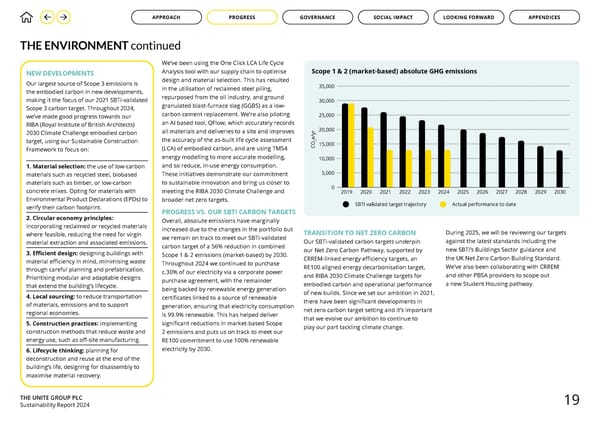NEW DEVELOPMENTS Our largest source of Scope 3 emissions is the embodied carbon in new developments, making it the focus of our 2021 SBTi-validated Scope 3 carbon target. Throughout 2024, we’ve made good progress towards our RIBA (Royal Institute of British Architects) 2030 Climate Challenge embodied carbon target, using our Sustainable Construction Framework to focus on: 1. Material selection: the use of low-carbon materials such as recycled steel, biobased materials such as timber, or low-carbon concrete mixes. Opting for materials with Environmental Product Declarations (EPDs) to verify their carbon footprint. 2. Circular economy principles: incorporating reclaimed or recycled materials where feasible, reducing the need for virgin material extraction and associated emissions. 3. Efficient design: designing buildings with material efficiency in mind, minimising waste through careful planning and prefabrication. Prioritising modular and adaptable designs that extend the building’s lifecycle. 4. Local sourcing: to reduce transportation of materials, emissions and to support regional economies. 5. Construction practices: implementing construction methods that reduce waste and energy use, such as off-site manufacturing. 6. Lifecycle thinking: planning for deconstruction and reuse at the end of the building’s life, designing for disassembly to maximise material recovery. THE ENVIRONMENT continued THE UNITE GROUP PLC Sustainability Report 2024 We’ve been using the One Click LCA Life Cycle Analysis tool with our supply chain to optimise design and material selection. This has resulted in the utilisation of reclaimed steel piling, repurposed from the oil industry, and ground granulated blast-furnace slag (GGBS) as a low- carbon cement replacement. We’re also piloting an AI based tool, QFlow, which accurately records all materials and deliveries to a site and improves the accuracy of the as-built life cycle assessment (LCA) of embodied carbon, and are using TM54 energy modelling to more accurate modelling, and so reduce, in-use energy consumption. These initiatives demonstrate our commitment to sustainable innovation and bring us closer to meeting the RIBA 2030 Climate Challenge and broader net zero targets. PROGRESS VS. OUR SBTI CARBON TARGETS Overall, absolute emissions have marginally increased due to the changes in the portfolio but we remain on track to meet our SBTi-validated carbon target of a 56% reduction in combined Scope 1 & 2 emissions (market-based) by 2030. Throughout 2024 we continued to purchase c.30% of our electricity via a corporate power purchase agreement, with the remainder being backed by renewable energy generation certificates linked to a source of renewable generation, ensuring that electricity consumption is 99.9% renewable. This has helped deliver significant reductions in market-based Scope 2 emissions and puts us on track to meet our RE100 commitment to use 100% renewable electricity by 2030. GOVERNANCE APPROACH PROGRESS SOCIAL IMPACT LOOKING FORWARD APPENDICES kWh/bed/yr Scope 1 & 2 (market-based) absolute GHG emissions SBTi validated target trajectory Actual performance to date 2019 2020 2021 2022 2023 2024 2025 2026 2027 2028 2029 2030 25,000 30,000 35,000 15,000 5,000 20,000 10,000 0 CO2e/yr TRANSITION TO NET ZERO CARBON Our SBTi-validated carbon targets underpin our Net Zero Carbon Pathway, supported by CRREM-linked energy efficiency targets, an RE100 aligned energy decarbonisation target, and RIBA 2030 Climate Challenge targets for embodied carbon and operational performance of new builds. Since we set our ambition in 2021, there have been significant developments in net zero carbon target setting and it’s important that we evolve our ambition to continue to play our part tackling climate change. During 2025, we will be reviewing our targets against the latest standards including the new SBTi’s Buildings Sector guidance and the UK Net Zero Carbon Building Standard. We’ve also been collaborating with CRREM and other PBSA providers to scope out a new Student Housing pathway. 19 GOVERNANCE APPROACH SOCIAL IMPACT LOOKING FORWARD APPENDICES PROGRESS
 Making a Positive Impact: Unite Students Sustainability Report 2024 Page 19 Page 21
Making a Positive Impact: Unite Students Sustainability Report 2024 Page 19 Page 21